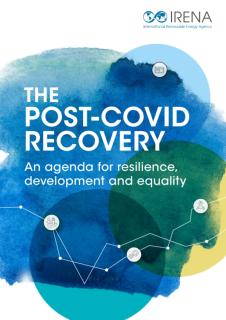
Increased uptake of renewables, energy efficiency and related energy-transition measures represent far-sighted investment amid the crisis set off by the COVID-19 pandemic. As part of short-term stimulus and recovery plans, the energy transition provides a crucial link to medium- and long-term global climate and sustainability goals.
This report from the International Renewable Energy Agency (IRENA) offers practical advice on key investment and policy decisions for the crucial post-COVID recovery. It is rooted in the comprehensive long-term energy transformation strategy provided by IRENA’s first Global Renewables Outlook.
Key policy recommendations for the 2021-23 recovery phase include:
- Ambition: Raising national targets and enhancing climate pledges.
- Public intervention: Securing strategic finance, investing in transition-related infrastructure, steering investment away from fossil fuels, and making bailouts conditional on climate action.
- Power sector investment: Safeguarding existing renewable projects and ensuring stable policy frameworks for transition-related infrastructure.
- Heating and cooling investment: Scaling up transition-related technologies through quotas and mandates and creating the infrastructure for district systems and green hydrogen.
- Transport investment: Creating renewable-based, efficient infrastructure, incentivising electric vehicle and biofuel use, and promoting behavioural changes to reduce the impact of travel.
- Employment: Protecting existing jobs, supporting workforce expansion in transition-related fields, co-ordinating with industries and developing education and training to minimise skills gaps.
- Industry: Diversifying supply chains, developing local industries, providing finance and promoting supplier development programmes and industry clusters.
- Access: Maintaining energy access initiatives, ensuring reliable power supply and supporting distributed renewable energy solutions to strengthen health, sanitation and other critical infrastructure.
